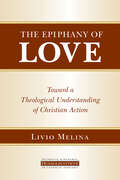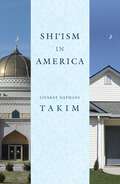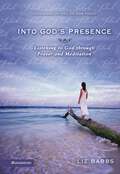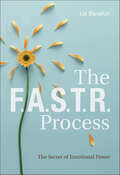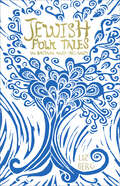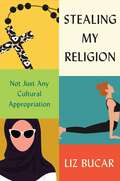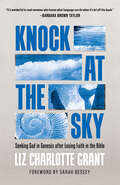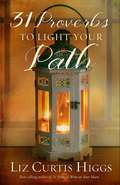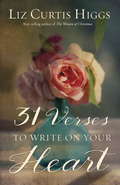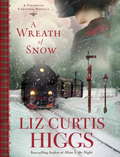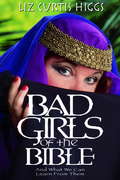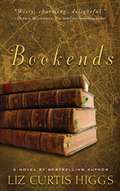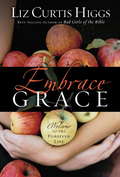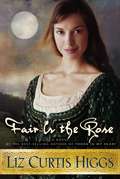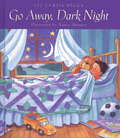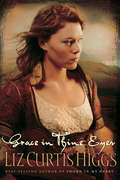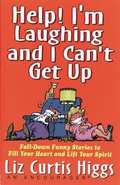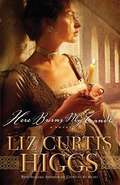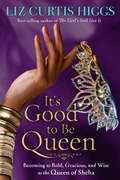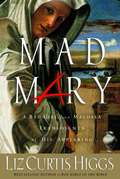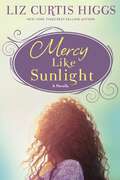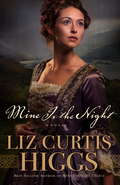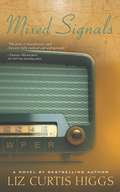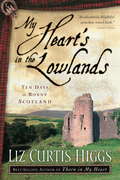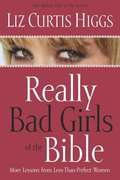- Table View
- List View
The Epiphany of Love: Toward a Theological Understanding of Christian Action (Ressourcement: Retrieval and Renewal in Catholic Thought (RRRCT))
by Livio MelinaIn this volume Livio Melina attempts to overcome the deadlock in which moral theology can easily find itself due to the false alternative between moralism, with its emphasis on external rules, and antimoralism, with its insistence on freedom from all norms. The key, Melina argues here, is not to regard morality as a simple list of principles directing our choices and helping us to make correct moral judgments. Rather, we must step back and begin to comprehend the dynamic mystery of Christian action. Only in the light of Christ can the proper correlation between faith and morality, freedom and truth, be clearly understood. True morality springs from a synergistic relationship with God, born of faith in Christ, nurtured in the church, and made manifest in that which inspires all authentic goodness -- the epiphany of love.
Shi'ism in America
by Liyakat Nathani TakimAn authoritative introduction to the Shi&’i community in America, tracing its history, composition, and the development of American Shi&’i identity. There are over two million Shi&’is Muslims in the United States. With community roots going back sometimes close to one hundred years, Shi&’is can be found in major cities like New York, Los Angeles, Chicago, Washington, and Dearborn, Michigan. Early in the century, Shi&’is and Sunnis sometimes arrived at the same time, worshipped together, shared similar experiences, and confronted the same challenges despite their sectarian differences. In this comprehensive study, Liyakat Nathani Takim provides an in-depth account of the American Shi&’i experience. Both tracing the early history and illuminating the more recent past with surveys and interviews, Takim explores the life of this community. Filling an important scholarly gap, he also demonstrates how living in the West has impelled the Shi&’i community to grapple with the ways in which Islamic law may respond to the challenges of modernity. Shi&’ism in America provides a much-needed overview of the history of this United States religious community, from religious, cultural, and political institutions to inter-group relations, to the experience of African American Shi&’is.
Into God's Presence: Listening to God through Prayer and Meditation
by Liz Babbs Rev Rob FrostFor the heart that longs for communion with Christ… For the soul that thirsts for intimacy with its Creator… For the man or woman in search of a living relationship with the Living God… Meditation and contemplative prayer have been described as the best-kept secrets in the church. Introducing this ancient spiritual discipline and applying it to the needs of busy contemporary people, Into God’s Presence helps readers bring the gentle rhythms of grace into a twenty-four/seven world. From one-minute meditations for hectic days to contemplating Scripture for spiritual insight, readers will discover a wide range of practices for creating a deeper intimacy with God in their daily prayer life. Into God’s Presence offers simple and accessible ways to communicate with God in prayer every day, encouraging readers to integrate the timeless practice of meditative prayer into modern life. This delightful book on meditation is a timely reminder of our need to be still before God, in order to hear from him. – Fiona Castle Liz Babbs book gives a friendly and approachable introduction to Christian meditation, and will stimulate many to venture into an enriching and rewarding new journey with Jesus Christ. -- Rev Dr Rob Frost I’ve enjoyed all Liz’s books, but this one beats them all! She manages to make the mysterious and complex subjects of contemplative prayer, Christian meditation and knowing God intimately seem easy and possible even for a busy ‘Martha’ like me! – Jennifer Rees Larcombe
The F.A.S.T.R. Process: The Secret of Emotional Power
by Liz BarallonFASTR: Feel, Acknowledge, Start, Thank, Release. What if you could overcome society's deep-rooted cultural negative programming? Imagine the life you would be able to manifest! The FASTR Process is designed to help you master the art of guiding and elevating your emotions. By harnessing 29 powers, you can overcome any obstacle and improve your self-confidence. Use balance and intention to attract your desires and find your "True Purpose" in life. Get ready . . . life's about to go a lot FASTR!
Jewish Folk Tales in Britain and Ireland (Folk Tales)
by Liz BergIn this book of folk tales, Liz Berg shares Jewish memories: authentic tales, songs and jokes told by Jews in Britain and Ireland. Some stories moved from place to place, changing and adapting to new landscapes and taking on different textures, but the core of the story stays the same and is preserved through oral storytelling and recorded on these pages. Here are tales from the time of Domitian’s Jewish slaves working in the tin mines of Cornwall, through to the tales being told in communities today, all incorporating the wit and magic of a rich and varied culture successfully integrated into Britain and Ireland.
Stealing My Religion: Not Just Any Cultural Appropriation
by Liz BucarFrom sneaker ads and the “solidarity hijab” to yoga classes and secular hikes along the Camino de Santiago pilgrimage route, the essential guide to the murky ethics of religious appropriation.We think we know cultural appropriation when we see it. Blackface or Native American headdresses as Halloween costumes—these clearly give offense. But what about Cardi B posing as the Hindu goddess Durga in a Reebok ad, AA’s twelve-step invocation of God, or the earnest namaste you utter at the end of yoga class?Liz Bucar unpacks the ethical dilemmas of a messy form of cultural appropriation: the borrowing of religious doctrines, rituals, and dress for political, economic, and therapeutic reasons. Does borrowing from another’s religion harm believers? Who can consent to such borrowings? Bucar sees religion as an especially vexing arena for appropriation debates because faiths overlap and imitate each other and because diversity within religious groups scrambles our sense of who is an insider and who is not. Indeed, if we are to understand why some appropriations are insulting and others benign, we have to ask difficult philosophical questions about what religions really are.Stealing My Religion guides us through three revealing case studies—the hijab as a feminist signal of Muslim allyship, a study abroad “pilgrimage” on the Camino de Santiago, and the commodification of yoga in the West. We see why the Vatican can’t grant Rihanna permission to dress up as the pope, yet it’s still okay to roll out our yoga mats. Reflecting on her own missteps, Bucar comes to a surprising conclusion: the way to avoid religious appropriation isn’t to borrow less but to borrow more—to become deeply invested in learning the roots and diverse meanings of our enthusiasms.
Knock at the Sky: Seeking God in Genesis after Losing Faith in the Bible
by Liz Charlotte GrantIn the beginning was a work of art. What does Bible study look like after inerrancy? Do you have to give up studying Scripture when you no longer believe in its literal interpretation? Can you still believe this book is sacred even while renegotiating your relationship to the church? In Knock at the Sky, Liz Charlotte Grant offers compelling answers to these questions and more in this deeply personal commentary on the book of Genesis. Braiding together encounters with the natural world, Jewish midrash, and art criticism, Grant makes familiar Sunday school stories strange and offers a fresh vision for reading Scripture after deconstruction. For those who have known the book of Genesis as a weapon in the culture wars, Grant interprets the Bible&’s inspired book of beginnings as a work of art. Lyrical, insightful, and highly original, Knock at the Sky offers readers a capacious model for seeking God through Scripture even as one&’s faith continues to evolve. &“In this book, you too have permission to question the sacred without fearing . . . unbelief. Knock loudly. . . . Reject answers that do not admit complication. Seek the resonance at the base of the story. The seeking is the point. Because there, in your wandering, God is.&”
31 Proverbs to Light Your Path
by Liz Curtis HiggsTake Heart, Beloved. His Light Is Shining, And Your Path Is Clear.Wherever you are on your journey, here is the wisdom you need for the road ahead. Maybe you’re stuck and want to move forward. Or you feel anxious and long to know what’s next. Or you’re ready for an uplifting reminder that God holds your future in His loving hands. Chosen by hundreds of women as their favorite verses in Proverbs, these thirty-one nuggets of truth reveal how faithfully God honors His promise, “I will instruct you in the way of wisdom and lead you along straight paths” (Proverbs 4:11). Best-selling author Liz Curtis Higgs examines each word with care and adds a sprinkling of humor through her honest stories and personal examples. For each verse you’ll find a unique “One Minute, One Step” challenge—a do-it-now task that requires one minute or less. You’ll soon discover how practical and meaningful the book of Proverbs is as you apply its ancient wisdom to your thoroughly modern life. With a study guide included, 31 Proverbs to Light Your Path is a daily devotional and a small-group Bible study, wrapped in a beautiful gift book brimming with encouragement!
31 Verses to Write on Your Heart
by Liz Curtis HiggsHere are the words of hope you're looking for when your faith needs a boost or a friend needs encouragement. Chosen by more than a thousand women as their favorite verses in the Bible, each one is worth learning, worth sharing, worth remembering, You'll find verses you already know and love: "I can do all this through him who gives me strength" (Philippians 4:13). Others may be less familiar but are no less powerful: "Fear of man will prove to be a snare, but whoever trusts in the Lord is kept safe" (Proverbs 29:25). All of them capture the truth of God's goodness, mercy, and love for His own. Best-selling author Liz Curtis Higgs invites you to experience--A deeper, richer understanding of thirty-one treasured verses. A fresh look at how these timeless truths can impact your life. A new passion for memorizing Scripture, verse by verse. Thirty-one creative ways to keep them in your heart forever. With a Study Guide included, 31 Verses to Write on Your Heart is a daily devotional and a small group Bible study, wrapped in a lovely gift book overflowing with joy!From the Hardcover edition.
A Wreath of Snow: A Victorian Christmas Novella
by Liz Curtis Higgs"A wonderful story of redemption and restoration that will warm your heart during the Christmas season--or any time of year!"--Francine Rivers, best-selling author of Redeeming LoveWrapped in a cloud of steam, the engine rolled to a stop, the screech of metal against metal filling the frosty air. Snow blew across the railway platform and around Meg's calfskin walking boots. The weather definitely was not improving. She ordered tea with milk and sugar, eying the currant buns and sweet mincemeat tarts displayed beneath a bell jar. Later, perhaps, when her appetite returned. At the moment her stomach was twisted into a knot."Anything else for you?" the cashier asked as she handed over the tea, steaming and fragrant.Meg was surprised to find her fingers trembling when she lifted the cup. "All I want is a safe journey home.""On a day like this?" the round-faced woman exclaimed. "None but the Almighty can promise you that, lass." "A Wreath of Snow glows with warmth, charm, and grace. A wonderful read."--BJ HOFF, author of The Riverhaven Years seriesChristmas Eve 1894 All Margaret Campbell wants for Christmas is a safe journey home. When her plans for a festive holiday with her family in Stirling crumble beneath the weight of her brother's bitterness, the young schoolteacher wants nothing more than to return to the students she loves and the town house she calls home. Then an unexpected detour places her in the path of Gordon Shaw, a handsome newspaperman from Glasgow, who struggles under a burden of remorse and shame. When the secret of their shared history is revealed, will it leave them tangled in a knot of regret? Or might their past hold the threads that will bind their future together? As warm as a woolen scarf on a cold winter's eve, A Wreath of Snow is a tender story of love and forgiveness, wrapped in a celebration of all things Scottish, all things Victorian, and, especially, all things Christmas.
Bad Girls of the Bible: And What We Can Learn from Them (Bad Girls of the Bible)
by Liz Curtis HiggsWomen everywhere marvel at those "good girls" in Scripture-Sarah, Mary, Esther-but on most days, that's not who they see when they look in the mirror. Most women (if they're honest) see the selfishness of Sapphira or the deception of Delilah. They catch of glimpse of Jezebel's take-charge pride or Eve's disastrous disobedience. Like Bathsheba, Herodias, and the rest, today's modern woman is surrounded by temptations, exhausted by the demands of daily living, and burdened by her own desires. So what's a good girl to do? Learn from their lives, says beloved humor writer Liz Curtis Higgs, and by God's grace, choose a better path. In Bad Girls of the Bible, Higgs offers a unique and clear-sighted approach to understanding those "other women" in Scripture, combining a contemporary retelling of their stories with a solid, verse-by-verse study of their mistakes and what lessons women today can learn from them. Whether they were "Bad to the Bone," "Bad for a Season, but Not Forever" or only "Bad for a Moment," these infamous sisters show women how not to handle the challenges of life. With her trademark humor and encouragement, Liz Curtis Higgs teaches us how to avoid their tragic mistakes and joyfully embrace grace.
Bookends
by Liz Curtis HiggsOpposites Attract? Dr. Emilie Getz and Jonas Fielding are as different as two people could possibly be--the same age, with the same faith, living in the same small Pennsylvania town. She's a first-class neatnik; he's a world-class slob. She's into saving historical relics; he's into saving souls. But perhaps opposites do attract. For when this uptight historian and this laid-back land developer meet, sparks fly. And despite the rather inauspicious beginning to their relationship, neither one will escape unchanged...or unsmitten! "A well-written, delightful concoction of romance, humor, tenderness, and fun." Lisa Samson, author of Tiger Lillie Opposites attract? Maybe not. Emilie Getz and Jonas Fielding are as different as two people--of the same age, with the same faith, living in the same charming Pennsylvania town--could be. She loves history; he loves new ideas. She sticks to the rules; he likes to break them. She's into saving relics; he's into saving souls. The one trait they share is a penchant for controlling every aspect of their lives, including their stubborn hearts. When Emilie's search for an archaeological treasure leads her to the one piece of land she can't have (thanks to Jonas), they choose opposing sides in an engaging battle of wits. Emilie, a no-nonsense sort of woman, is determined to have her way. But Jonas is on a mission as well: He wants to hear Emilie laugh. Often. "Liz Curtis Higgs mixes her usual humor into this entertaining story of roller-coaster romance." Christian Retailing "Delicious as Moravian sugar cake! Readers will love it." Lori Copeland, author of Roses Will Bloom Again "Bookends is such fun...rich in character, setting, and spiritual dimensions." Gayle Roper, author of Winter Winds "A great story with believable characters, realistic situations, and a sprinkling of Higgs's humor." K-LOVE News & Reviews "Declare a holiday and cozy up with this engaging novel." Patsy Clairmont, author of Stardust on My Pillow Story Behind the BookThough she has traveled the world, Liz Curtis Higgs is a small-town girl at heart. In Bookends, Liz invites readers to visit a place she knows well: her hometown of Lititz, nestled in the rolling hills of historic Lancaster County , Pennsylvania . Fond memories of her childhood years in the Moravian church--one of the oldest of the Protestant denominations--and her love for Lititz history and traditions serve as a solid underpinning for this lively contemporary tale. Like many couples, Emilie and Jonas resemble human bookends--opposites in every way--until Emilie's joy-filled spiritual awakening turns their stubborn hearts in the same happy direction.From the Trade Paperback edition.
Embrace Grace: Welcome to the Forgiven Life
by Liz Curtis HiggsThe forgiven life. The grace-filled life. It begins with an embrace. Wherever you are spiritually, whatever you have been through emotionally, you are already enfolded in the arms of One who believes in you, supports you, treasures you. He is waiting for you to embrace him in return. To accept the gift he's offering you. To listen for the whispered words you've longed a lifetime to hear: You are loved. All is forgiven.
Fair Is the Rose (Lowlands of Scotland #2)
by Liz Curtis HiggsThe Scottish Lowlands, October 1789.A year has come and gone since Jamie McKie fled for his life, arriving at Auchengray in search of sanctuary and a bonny wife. Young Rose McBride, as fair a lass as any in Scotland, dearly loves her handsome cousin--but so does her older sister, Leana. Determined to have Jamie all to herself, Rose puts in motion one desperate plan after another, enlisting the aid of Lillias Brown, a wise woman--a wutch, some say--still keen on the old ways. Impetuous Rose ignores the cruel whispers that travel up and down the parish hills, never dreaming of the tragic consequences that await her.Her sister, Leana, clings to her hard-won sense of peace and assurance by a slender thread of faith. Day and night, Leana's hours are apent caring for wee Ian and praying that her future will hold more promise than her past.Jamie McKie is busy making his own plans to return home to Glentrool and claim his inheritance. To do so means facing Evan, the brother whose blessing he stole, and Alec, the father whom he ruthlessly deceived. It is a perilous journey that will test the depth of his courage, the strength of his sword, and the tenacity of his vow to honor Almighty God, no matter the cost.From the Trade Paperback edition.
Go Away, Dark Night
by Liz Curtis Higgs Nancy MungerThe darkness can be scary. But nobody needs to be afraid of the dark. That’s the encouraging message inGo Away, Dark Night,the newest children’s book by Liz Curtis Higgs (author of the best-selling Parable series:The Pumpkin Patch Parable, The Parable of the Lily, The Sunflower Parable,andThe Pine Tree Parable). Go Away, Dark Nightis the story of a young boy named Griffin who is afraid of the dark. Every night when he turns out the lights, his room turns as black as a starless sky. Griffin tries to be brave, but his toes curl up and his hands grow cold and his heart beats fast and his legs turn to jelly. If only someone could help him! Is there anybody big enough to keep him safe? Can anyone take away the shakes and the shivers and the quivers? Parents and children alike will find out what Griffin learns in this heart-warming modern children’s classic, carefully crafted to help young children place their trust in the Lord. From the Hardcover edition.
Grace in Thine Eyes (Lowlands of Scotland #4)
by Liz Curtis HiggsGlen of Loch Trool. Spring 1808. Davina McKie is a bonny lass of seventeen, as clever as they come and a gifted musician. Unable to speak since childhood, she is doted on by her belligerent younger brothers, Will and Sandy, who vow to protect their silent sister.When the lads are forced to depart the glen, Jamie McKie intends to brighten his daughter's summer by escorting Davina to the Isle of Arran. Her cousins make her welcome at the manse, and the parish delights in hearing their talented fiddler.But when she catches the eye of a handsome young Highlander on Midsummer Eve, sheltered Davina is unprepared for the shocking events that follow.A timeless story of passion and revenge, of lost innocence and shattered dreams, Grace in Thine Eyes explores the sorrow of unspeakable shame and the gift of immeasurable grace."Just as Davina is a master of the fiddle, Liz Curtis Higgs is a master of the written word." -Teresa Medeiros, New York Times best-selling author "A phenomenal story that beautifully parallels its biblical counterpart." -Tracie Peterson, best-selling author of What She Left for Me"Absolutely wonderful. Higgs manages to turn history and imagery and language into an unforgettable work of art."-B. J. Hoff, author of A Distant MusicA Reader's Guide and Scottish Glossary Are IncludedFrom the Trade Paperback edition.
Help! I'm Laughing and I Can't Get Up: Fall-down Funny Stories to Fill Your Heart and Lift Your Spirit
by Liz Curtis HiggsDiscover seven reasons why people laugh, plus seven body benefits of laughter. Reveals the four humor personalities. . . and which category you fit in. Helps readers realize that God gave us a funny bone. . . we just need to find out how to use it.
Here Burns My Candle: A Novel (Here Burns My Candle Series #1)
by Liz Curtis HiggsA mother who cannot face her future. A daughter who cannot escape her past. Lady Elisabeth Kerr is a keeper of secrets. A Highlander by birth and a Lowlander by marriage, she honors theauldways, even as doubts and fears stir deep within her. Her husband, Lord Donald, has secrets of his own, well hidden from the household, yet whispered among the town gossips. His mother, the dowager Lady Marjory, hides gold beneath her floor and guilt inside her heart. Though her two abiding passions are maintain...
It's Good to Be Queen
by Liz Curtis HiggsSheba Journeyed Across the Desert with a Caravan of Riches, Only to Find the Greatest Treasure of Them All. So Can You.When it comes to famous queens of the Bible, we know the good one, Queen Esther, and the bad one, Queen Jezebel. Now meet the wise one, the queen of Sheba, who traveled to Jerusalem to test the mind and heart of a king. Her quest for wisdom will surprise you, challenge you, inspire you, change you. This wealthy royal from antiquity will show you how to live boldly, seek after truth, ask the right questions, encourage others, receive graciously, and honor the Lord above all. Shedding new light on this ancient biblical role model, Liz Curtis Higgs unveils timeless wisdom for all who aspire to please the king of Kings. From the Trade Paperback edition.
Mad Mary: A Bad Girl from Magdala, Transformed at His Appearing
by Liz Curtis HiggsCome meet the genuine Mary Magdalene of the Bible -- not the scarlet-draped legend -- and follow her one-of-a-kind story of deliverance and dedication, despair and declaration. Like my previous "Bad Girls" books, "Mad Mary" begins with the fictional journey of Mary Margaret Delaney, a bad woman-or was it madwoman? -- adrift in contemporary Chicago, desperate for someone to save her from herself. Once Mary Delaney's story has prepared our hearts for learning, we'll leave the Windy City and go verse by verse through Mary of Magdala's ancient biblical tale, tossing aside modern misconceptions as we embrace the real Mary M. Prepare to be amazed by this eye-opening sister who was transformed twice when You-Know-Who showed up and spoke her name.
Mercy Like Sunlight: A Novella
by Liz Curtis HiggsWho Will Set Her Free from the Darkness Inside?Mary Margaret Delaney hides in the shadows, her arms scarred, her heart wounded by grief and weighed down with regret. Adrift on the streets of Chicago, she is surrounded by strangers and hounded by demons, both real and imagined. Her neighbors in Lincoln Park call her Mad Mary—until a fearless young pastor dares to call Mary his friend.Inspired by the biblical account of Mary Magdalene, this touching contemporary story first appeared in Liz&’s nonfiction book, Mad Mary, later titled Unveiling Mary Magdalene. Now updated as a stand-alone novella, Mercy Like Sunlight is a powerful tribute to God&’s boundless compassion and unending grace.&“I was deeply moved by the story of Pastor Jake and Mary Margaret Delaney. So well written. So challenging to me. So Christlike. And so Chicago!&”—Neta Jackson, best-selling author of The Yada Yada Prayer Group&“Irresistible, unconditional love shines through on each and every page!&”—Sharon Ewell Foster, Christy Award-winning author of Passing by Samaria
Mine Is the Night: A Novel (Here Burns My Candle Series #2)
by Liz Curtis HiggsSHE LOST EVERYTHING SHE LOVED.HE HAD EVERYTHING SHE NEEDED.BUT COULD SHE FIND THE COURAGE TO TRUST HIM?Stepping from a battered coach on a rainy April eve, newly widowed Elisabeth Kerr must begin again, without husband or title, property or fortune. She is unafraid of work and gifted with a needle, but how will she stitch together the tattered remnants of her life? And who will mend her heart, torn asunder by betrayal and deception? Elisabeth has not come to Selkirk alone. Her mother-in-law, Marjory Kerr, is a woman undone, having buried her husband, her sons, and any promise of grandchildren. Dependent upon a distant cousin with meager resources, Marjory dreads the future almost as much as she regrets the past. Yet joy still comes knocking, and hope is often found in unexpected places. Then a worthy hero steps forward, rekindling a spark of hope. Will he risk his reputation to defend two women labeled as traitors to the Crown? Or will a wealthy beauty, untainted by scandal, capture his affections? The heartrending journey of the Kerr women comes to a glorious finish in Mine Is the Night, a sparkling gem of redemption and restoration set in eighteenth-century Scotland. From the Trade Paperback edition.
Mixed Signals
by Liz Curtis HiggsLove Is on the Air Belle O'Brien, the woman behind the warmest voice in Virginia radio, has one problem: Her oldies show on WPER-FM is a solid-gold hit, but her love life, at thirty-two years and counting, is an off-the-charts disaster. The pickings are slim in small-town Abingdon. Will it be smooth-talking Patrick Reese, the man who launched her radio career a decade earlier? Moody but handsome David Cahill, the chief engineer with a mysterious past and a new life in Christ? Or Matthew the Methodist, her pastor across the street? Surrounded by an on-air cast of colorful characters, Belle's journey toward joy is filled with humor, heartache, and endless surprises. Norah Silver-Smyth, her friend and encourager, will join Belle in discovering that it's never too late to listen to your heart. "One of the most delightful surprises I've had all year-- a first novel that moved me to both laughter and tears!" Susan Wiggs, USA Today bestselling author Love Is on the Air Belle O'Brien, the woman behind the warmest voice in Virginia radio, has a problem: Her oldies show is a solid-gold hit, but her love life is an off-the-charts disaster. Her prospects for a husband are small-town slim. Will it be smooth-talking Patrick Reese, who launched her radio career? Moody but handsome David Cahill, WPER's enigmatic broadcast engineer? Matthew the Methodist, her oh-so-available pastor? Or the mysterious radio listener who signs his letters, "All Ears in Abingdon"? As Belle embarks on a journey toward joy, Norah Silver-Smyth, proprietor of The Silver Spoon, cooks up her own delicious recipe for happily-ever-after in this winsome tale filled with humor, tenderness, endless surprises...and two happy endings! "Liz Curtis Higgs...has succeeded magnificently with her first fictional effort." K-LOVE News & Reviews "Christian fiction isn't known for humorous books, so this title is a special joy." Library Journal "Great laughs, good solid story, surprises and twists, and great characters." Francine Rivers, bestselling author of Redeeming Love "Absolutely wonderful. An outstanding and heart-warming debut!" Angela Elwell Hunt, author of The Note "Mixed Signals was my sweet reward at the end of my demanding days...a most satisfying treat!" Jane Johnson Struck, Senior Editor, Today's Christian WomanStory Behind the BookBefore she became a platform speaker, Liz Curtis Higgs spent ten years as a successful radio personality, moving town to town, up and down the dial. In Mixed Signals, Liz draws on that memorable decade to create WPER, an oldies station in Abingdon , Virginia . The Barter Theater was included with thanks to her experience with amateur drama productions, and the ten hot-air balloon ascents she weathered while a broadcaster were also put to use. Her heroine, Belle, marries a radio station engineer...just as Liz did nearly twenty years ago. But there the parallels end in this winsome tale with two happy endings.From the Trade Paperback edition.
My Heart's in the Lowlands: Ten Days in Bonny Scotland
by Liz Curtis Higgs“Let’sgo,shall we? Just the two of us?” “I consider Galloway the country’s best kept secret: a place where time holds its breath, where ancient ruins dot the countryside in moss-covered splendor, where the natives are friendly and tourists are few, only because they don’t know what they’re missing. “So, ten days in bonny Scotland. You’ll join me, aye?” –fromMy Heart’s in the Lowlands Best-selling novelist Liz Curtis Higgs invites you to take an entertaining journey through the South West of Scotland, known as Dumfries and Galloway. Without crossing the pond, changing time zones, or driving on the left side of the road, you’ll explore quaint villages and crumbling castles, old bookshops and charming tearooms in the delightful company of a guide whose love for this quiet nook of Scotland illuminates every page. The verdant hills and glens of the Lowlands are awash in history, rich with culture, and peopled with engaging characters. The setting for Higgs’s acclaimed series of historical novels, Dumfries and Galloway also serves as her home away from home. Her decade-long love affair with this unique area of the world, combined with her award-winning storytelling skills, makes her the ideal armchair travel companion. Warm, personal, and deeply evocative,My Heart’s in the Lowlandstransports you to an unforgettable corner of Scotland that will lay claim to your heart forever. Liz Curtis Higgsis the best-selling author of 25 books, including her Scottish historical novelsThorn in My Heart, Fair Is the Rose, Whence Came a Prince,andGrace in Thine Eyes. She is currently writing her fifth historical novel,Here Burns My Candle. From the Trade Paperback edition.
Really Bad Girls of the Bible: More Lessons From Less-Than-Perfect Women
by Liz Curtis HiggsIf you've already read Bad Girls of the Bible, welcome back. If this is our first chance to sit across the page from one another, welcome home. Trust me. it's a safe place to be-a place of grace, not judgment. A place where God is in charge and we're not. (Whew!) You'll meet eight women here whose names you may not recognize, but whose sordid stories felt uncomfortably familiar to this Former bad Girl. Athaliah's ruthless climb up the corporate ladder cut close to the bone. Ditto for the tawdry tale of David and Bathsheba-my, didn't her Good Girl status go down the drain in a hurry? Ah. but it didn't stay there.That's the good news, sisters. Really good, in fact. Whether they were bad and proud of it, Bad for a good reason, Bad but not condemned, or found themselves in the wrong place at the wrong time under a Bad Moon Rising, the lives of these Really Bad girls of the Bible all demonstrate one thing: God's sovereignty. Honey, we're talking "Thy will be done." Period. The unstoppable power of God to press forth with his mighty plan for mankind, not working around our sinful choices but through them. Imagine that. Although we're all less than perfect, the girls and I are more than ready when you are!
